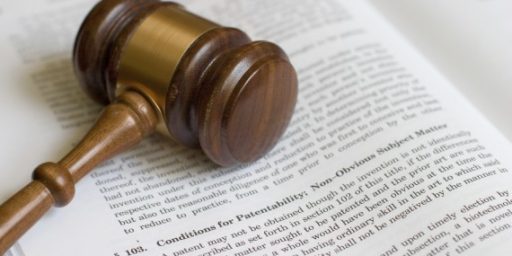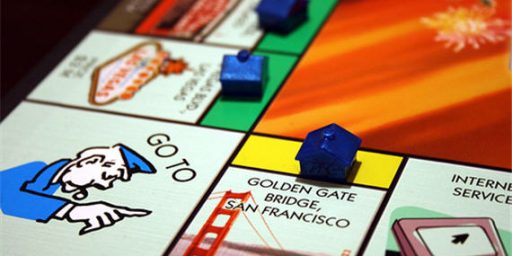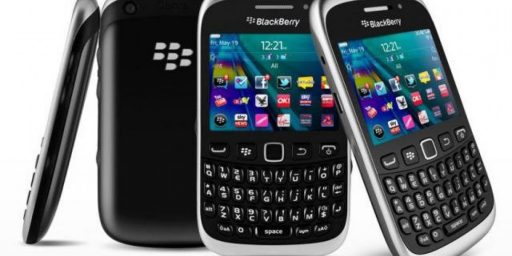BlackBerry Could be Killed by Patent Troll
The seemingly ubiquitous BlackBerry devices may soon be out of commission because of a lawsuit for a dead patent troll.
Blackberry held hostage (FORTUNE)
What would Osama bin Laden give to be able to knock out every BlackBerry in America and achieve an instant, sweeping disruption of commerce? The good news is he can’t do it. The weird and disconcerting news is that a company called NTP can and, unless it’s paid off, probably will sometime before Christmas.
NTP has this remarkable power because it is nearing victory in its four-year-old patent litigation with Research in Motion, the maker of the BlackBerry. RIM faces the real likelihood of a court-ordered BlackBerry blackout (government devices would be exempted) unless it agrees to pay essentially whatever sum NTP names, which some analysts think will approach ten figures.
However the endgame plays out, it vividly illustrates a recurring lightning-rod issue in patent debates — one that pits the information technology industry, which favors reform, against many others, such as the pharmaceutical industry, which don’t. Should plaintiffs like NTP — which does not market a competing product, never has, and never will — be entitled to an automatic injunction shutting down a productive infringer such as RIM?
NTP was founded in 1991 by the late inventor Thomas Campana and his patent attorney, Donald Stout, of Arlington, Va. It has no employees and makes no products. Its main assets, Campana’s patents, have spent most of the past decade in Stout’s file drawer. But in 2002 a federal jury found that RIM had infringed five NTP patents that relate to integrating e-mail systems with wireless networks. An appellate court largely agreed in August 2005, and in late October the U.S. Supreme Court declined to issue a stay while it ponders whether to hear the case.
No one has claimed that RIM ever copied NTP’s patents. But under the law — and this isn’t even the controversial part — that doesn’t matter. As long as NTP staked its claim first, if RIM later independently wandered into the same intellectual territory and managed, unlike NTP, to invent and produce a wildly popular product, it is an infringer.
[…]
The Business Software Alliance, led by companies like Apple, Intel and IBM, has argued before Congress that there is often no “irreparable harm” when the plaintiff isn’t making any product, since a reasonable royalty will give that plaintiff everything to which it is entitled.
“The patent troll” — the derogatory term for such plaintiffs — “has zero interest in killing the goose laying golden eggs,” says Matt Powers, a patent litigator at Weil Gotshal & Manges who represents Intel and Microsoft. Though the troll wants to negotiate a license, he adds, his potential power to shut down the defendant’s product line gives him an unfair advantage. The situation is exacerbated, he notes, when the product — a Pentium processor, for example — contains thousands of inventions.
Clearly, coming up with vague ideas and then not doing anything about them is not what intellectual property law is trying to protect.
Interestingly, the Federal government has stepped in to protect its own access to the popular devices.
No BlackBerry, No Life (Business Week)
Some people make jokes about Washington wonks being attached to their BlackBerry e-mail devices, but the government takes the service very seriously. The Justice Department has filed a legal brief in a patent dispute, asking a federal court to delay any immediate shutdown of the popular wireless e-mail system to ensure that state and federal workers can continue to use their devices.
[…]
The Justice Department, filing on behalf of various government agencies, requested a stay of 90 days to put together an electronic database of government users whose service should not be cut off in the event Research In Motion loses its final legal battles and does not reach a settlement. In addition, the statement of interest filed by Justice said the government is concerned “there may be a substantial public interest that may be impaired” by shutting down the service. There are more than 3 million BlackBerry users in the United States, nearly 10 percent of whom are state and federal government employees who use the devices to keep in contact when out of the office.
This particular dispute may be moot soon, as RIM claims it has developed a workaround that would use different software independent of NTP’s patents. Still, a most disturbing application of patent law.





The irony is that RIM used to be so sue-happy itself that it was commonly derided as “lawsuits in motion.”
Anywho, last thing I read about this made it sound like a game of chicken neither side can totally afford to allow to come to a fatal conclusion. The troll gets nothing if they shut RIM down (or if RIM has too much incentive to create an alternative in time), so it is worth their while to make sure they get paid something, trying to maximize it while not going too far. RIM can’t afford to be shut down, so it’s worth their while to pay something, even a lot, so long as it’s not so much that paying puts them effectively out of business.
IIRC the figure I saw bandied about last time I read about this was $650 million, but I could be remembering wrong. It was absurdly high, anyway. I hope the patent is narrow enough for RIM to get around it technologically without paying, leaving the troll out in the cold.
You would perhaps prefer the opposite that a well funded company could continue to infringe a patent because the patent holder has no way of stopping them.
RIM could have settled for a lot less if they had settled before trial. The threat to “knock out” all the blackberry devices would never have developed if (as found by a jury) RIM hadn’t infringed on the patent.
The whole idea behind the patent system is that in return for a disclosure on how to do something novel and innovative, we grant exclusive use of the patented product for a number of years. The idea of rewarding those who innovate is so important and has been recognized as a good thing for so long that the foundations of patent law were put into the original constitution.
yet another john:
The issue is complex but let’s just say there are companies which file as many patents as they can and then hope to intimidate. One solution is to make patents public for review because in many cases these patents consist of well known techniques.
Some control needs to exist. Fortunatly for us many serious technology companies filed most patents for their own protection, there have been times when IBM in theory could have shut down everything.
The whole situation is perfectly designed for the nitpicking of lawyers. It is a real threat which could shut down many companies and drive open source underground. It can stifle innovation.
It is something that “ownership societies” like because it is coherant with the feudal economic notions of the right where governments role is to condemn land for nobles like George Bush at one third value and build him a baseball park soi after six tries with help from his family friends he can be successful, government is also supposed to act as a gateway to good jobs were people like Cheney and Rumsfeld can sell contacts. elated to this are things like Senator Hatch’s proposed legislation that would give media companies the right to search your computer and destroy it if they felt it contained unauthorized material. We already have situatins were you can’t copy material you created because the same technology could be used to copy the property of the owner class.
The problem is that this is simply going to drive the innovative underground and overseas. Wealth is not static. The rightwing dream that the proper people can own everything and tax all transactions is a dead end.
Reasonable intellectual property laws can be put into place. This of course offends the right who find the internet an abomination because it was government sponsored and created by communal activity. So they wish to strike back.
Whether you agree with NTP’s position or not, comparing a company seeking to enforce a patent in court to one of Osama bin Laden’s terror attacks is just completely ridiculous.
Stormy: I don’t see a comparison being made, other than in the sense that, while our enemies couldn’t do it, our own system can.
There would be nothing wrong with the line, “Abe’s coffee shop survived the 9/11 attacks but, alas, not competition from Starbuck’s.”
Even though there’s no explicit comparison made, people aren’t in the habit of randomly juxtaposing things they consider completely unrelated. It’s clear the writer of the Fortune article is hostile to NTP, and he uses very emotional language throught the piece. The writer’s intent was to imply that NTP is as much a threat to our national well being as terrorists are.
An for the record, I think there WOULD be something wrong with the hypothetical line about Starbucks.
The ‘Blackberry’ device bears the nickname of a person — one whose peers prefer be not forgotten.
I want to make a bet with everyone.
I bet if Blackberry were shut down, the USA and the entire World would go on with business as usual and would not stop.
What I want to know is, where can I buy stock in NTP, if they’re going to be able to pull this off?
yet another john?
Jane, you have to be kidding right?
The inventor of the NTP patents (a little guy and possibly a left-winger like you) lost his tail trying to build a paging business. He tried to get his major competitors to take a low cost license on the technology he invented but they stole. They turned him down because they didn’t think he had the guts or the money to sue them. He gives up half interest in his patents to NTP. NTP spends 5 years trying to get RIM to settle. Two years ago the inventor dies. Maybe his family will get 1/4th after taxes and you think Bush and inventors are the cause of your problems…. I think not.
NTP is not a public company. Therefore, you cannot buy their stock. The same goes for most or these small inventive companies including wireless2web. Plus, the time to invest your money is before they sell or sue, not after. I noticed they had to halt trading on rimm stock today – Enough said.
In the midst of charges and counter-charges in the RIM/BlackBerry case, the central issue may become lost. RIM is a foreign multinational corporation found by the courts to have expropriated American inventions for their own gain. Foreign company theft of American innovation is widespread. This is a serious, on-going threat to America’s economic and national security and the RIM/BlackBerry case is a clear example.
Americans should be screaming for justice, starting with an injunction against RIM and a phased replacement of BlackBerry with Palm or alternative U.S.-invented devices.
As a matter of equitable public policy, it is time for all branches of American government and law enforcement to get rid of their BlackBerrys and replace them with an American product and service such as the Palm and the NTP licensed “Good Technologies” service which does the same tasks as the BlackBerry.
It is increasingly difficult for smaller inventors and patent holders to counter the marketing and legal strategies of bigger businesses, especially those financed by outside interests. And again, the RIM/BlackBerry case perfectly illustrates this practice. It is almost impossible to believe that a large, well-financed company like RIM failed to research all prior art in the patent system before bringing the BlackBerry to market.
The courts found that RIM squatted on another’s property and when they were caught, this large multinational corporation could have negotiated reasonable compensation to lease the use of the property. But RIM took the low road. RIM mobilized a massive legal, PR and lobbying effort to paint the victims as abusers: RIM attempted to gain the upper hand against NTP while promoting the argument that the original patent holder, and smaller company, really asked for it. After all, NTP’s technology was very desirable.
The argument is compelling. Every time an American patent protects a desirable innovation, it is bad policy and poor economics to stand by and allow larger multi-nationals to infringe on that patent and then steamroll the smaller company with a media and legal blitz that the smaller company is unable to counter.
In this instance, RIM has abused patent re-examination to try and break NTP. Not on the merits, but break them with punitive costs associated with the new adversarial reexamination procedures which at this point is something on the order of thirty separate re-examination requests.
There are many aspects to this particular case which can be explored and debated.
The facts in this case have become muddied with charges and counter charges and misleading reports, but fairness demands that the media, the public and government agencies honor the intent of the patent system to protect American inventors and innovation.